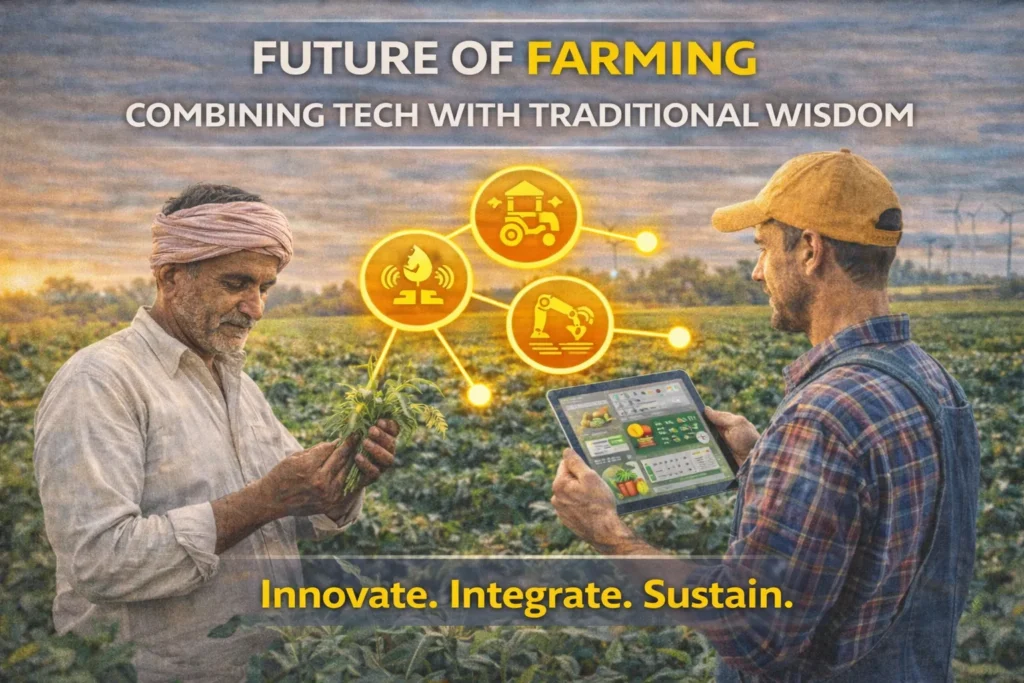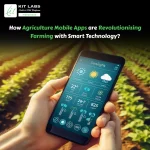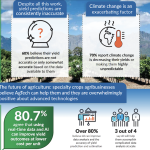Imagine a world where the food on your plate comes from farms that are not only efficient but also sustainable. This isn’t a distant dream—it’s happening right now.
The future of farming is here, and it’s a fascinating blend of cutting-edge technology and age-old wisdom. But what does this mean for you and your food security? By diving into this article, you’ll uncover how farmers are using drones, AI, and sensors alongside tried-and-tested traditional methods to revolutionize agriculture.
You’ll discover how these innovations can lead to healthier crops, reduced waste, and ultimately, a greener planet. Are you ready to explore how this powerful combination is shaping the farms of tomorrow and impacting your everyday life? Keep reading to find out more.
Innovative Technologies In Agriculture
Blending technology with age-old farming wisdom creates a promising future for agriculture. Drones, sensors, and AI enhance crop monitoring and boost yields. Sustainable practices ensure food security while respecting nature’s balance.
Innovative Technologies in Agriculture
The world of agriculture is experiencing a thrilling transformation. Farmers are now blending the old with the new, incorporating cutting-edge technology to enhance crop yield and sustainability. This fusion of tech and tradition is paving the way for smarter, more efficient farming practices.
Understanding Precision Agriculture
Precision agriculture is all about using technology to make farming more accurate and controlled. Tools like GPS, sensors, and drones are helping farmers monitor their fields with incredible detail. This means you can apply water, fertilizers, and pesticides exactly where they’re needed, reducing waste and saving money.
Imagine a farmer who once relied on intuition to judge soil moisture. Now, with soil sensors, they know the exact water content at any given moment. This data-driven approach can lead to healthier plants and bigger harvests.
The Role Of Drones In Modern Farming
Drones are becoming indispensable in agriculture. They provide aerial views of fields, helping you spot problems like pest infestations or water shortages early. With this bird’s-eye perspective, addressing issues becomes quicker and more efficient.
Drones can also assist in planting seeds and spraying crops. This automation saves time and labor, allowing you to focus on other essential tasks. How might your farm benefit from having eyes in the sky?
Ai And Machine Learning: The New Farmhands
Artificial intelligence (AI) and machine learning are transforming how farmers make decisions. These technologies analyze data to predict weather patterns, optimize planting schedules, and even forecast market trends. This predictive power helps you plan better and reduce risks.
Picture a farmer using AI to determine the best time to plant based on historical data and current weather forecasts. Such precision can lead to a more successful growing season. Are you ready to let AI become your farm’s new best friend?
Hydroponics And Vertical Farming: Growing Upwards
Hydroponics and vertical farming are revolutionizing space usage in agriculture. These methods allow you to grow crops in stacked layers, often indoors, using nutrient-rich water instead of soil. This technique conserves space and resources, making it perfect for urban areas or places with poor soil quality.
A friend of mine started a small hydroponic farm in his garage, producing fresh vegetables year-round. It’s amazing how much food you can grow in such a small area. Could this approach fit into your farming strategy?
Blockchain For Supply Chain Transparency
Blockchain technology is creating transparency in the agricultural supply chain. By recording every step a product takes from farm to table, blockchain ensures authenticity and quality. This can build trust with your customers, who increasingly care about where their food comes from.
Imagine tracking your produce from seed to sale, providing buyers with a detailed history. This transparency not only boosts consumer confidence but could also justify premium pricing. How could blockchain enhance your farming reputation?
As you consider these technologies, think about how they might integrate into your existing practices. Combining modern tech with traditional wisdom could be the key to future-proofing your farm. Are you ready to embrace the future of farming?

Traditional Farming Practices
Traditional farming practices have formed the backbone of agriculture for centuries. These methods have been passed down through generations. They are deeply rooted in local knowledge and cultural heritage. Farmers have relied on nature’s cues and rhythms to grow crops and raise livestock. As agriculture evolves, it’s essential to preserve these practices. They offer sustainable solutions and a profound connection to the environment.
Understanding Crop Rotation
Crop rotation involves changing the type of crops grown in a field each season. This practice prevents soil depletion. It enhances soil fertility naturally. Farmers use this technique to control pests and diseases. It contributes to healthier yields without chemical reliance.
Companion Planting
Companion planting pairs different plants together for mutual benefits. Some plants repel pests, while others enrich the soil. This synergy boosts growth and reduces the need for artificial fertilizers. Farmers have used this method to improve crop resilience and yield.
Natural Pest Control
Traditional farmers employ natural pest control methods. They use beneficial insects and other organisms. This reduces the reliance on chemical pesticides. It’s an eco-friendly approach that maintains biodiversity. Farmers can keep crops safe while preserving the environment.
Water Conservation Techniques
Water conservation has always been vital in farming. Traditional methods include rainwater harvesting and efficient irrigation practices. These techniques minimize water use and enhance sustainability. Farmers adapt these methods to ensure crops receive adequate hydration.
Soil Preservation
Preserving soil health is crucial for sustainable farming. Traditional practices include mulching and cover cropping. These methods prevent erosion and retain nutrients. They ensure the soil remains productive for future generations.
Integrating Tech With Traditional Methods
Embracing modern technology with age-old farming wisdom creates a sustainable future. Farmers enhance productivity while preserving traditions. This blend ensures food security and environmental care for future generations.
Integrating tech with traditional methods is reshaping the future of farming. Farmers today are bridging the gap between age-old practices and modern technology, creating a more efficient and sustainable approach. This blend not only enhances productivity but also supports environmental health, preserving the wisdom of past generations.
Understanding The Value Of Traditional Practices
Traditional farming methods have stood the test of time. They are deeply rooted in local cultures and ecosystems, offering insights into sustainable agriculture. Your ancestors may have used crop rotation or natural pest control, which are still relevant today.
These practices focus on balance and long-term health of the land. By respecting these methods, you can maintain soil fertility and biodiversity. This foundation is crucial when integrating new technologies.
Leveraging Technology For Precision Farming
Imagine using drones to monitor your fields. They can provide real-time data on crop health, moisture levels, and pest activity. This information allows you to make precise decisions, saving time and resources.
Technology like GPS-guided tractors ensures efficient land use. It reduces overlap in planting and harvesting, which minimizes fuel usage and soil compaction. This precision leads to higher yields and lower costs.
Enhancing Soil Health With Modern Tools
Modern soil sensors can give you instant feedback on nutrient levels. This helps in applying the right amount of fertilizers, reducing waste and environmental impact. You can tailor your approach to what the soil truly needs.
Combining these tools with traditional composting techniques can boost soil health. Compost adds organic matter, improving soil structure and nutrient content. By integrating both methods, you nurture a living soil ecosystem.
Boosting Water Efficiency Through Innovation
Water is a precious resource in farming. Drip irrigation systems, combined with sensors, ensure plants get just the right amount of water. This method reduces water usage significantly compared to older techniques like flood irrigation.
Rainwater harvesting can complement this system. By capturing rainwater, you create a sustainable water supply for dry spells. Balancing modern irrigation with traditional water conservation is key to enduring droughts.
Building A Resilient Farm Ecosystem
How do you create a farm that withstands climate challenges? By diversifying crops and livestock, you reduce risks associated with market fluctuations or weather extremes. Technology helps in selecting the right varieties for your conditions.
Use apps that predict weather patterns to plan planting and harvesting. By staying informed, you can adapt quickly to changes, protecting your crops and investments.
Fostering Knowledge Exchange
Communities thrive on shared knowledge. Online platforms allow farmers to exchange experiences and tips globally. You can learn from others who have successfully integrated tech with traditional methods.
Local workshops and farmer cooperatives can also be valuable. By engaging with your peers, you gain insights and support, strengthening the farming community.
Are you ready to embrace this future? By combining tech with traditional wisdom, you not only preserve your heritage but also pave the way for a sustainable tomorrow.
Impact On Sustainability And Productivity
As the world shifts towards sustainable living, the future of farming is increasingly intertwined with technology and traditional wisdom. This blend has profound effects on both sustainability and productivity. The question is, how does this combination impact the way we grow our food and care for our planet?
Enhancing Sustainability With Precision Farming
Precision farming uses technology to make farming more efficient. Imagine drones flying over fields to check crop health or sensors in the soil measuring moisture levels. These tools help farmers use resources like water and fertilizer more effectively, reducing waste and environmental impact.
You’ve probably heard about the importance of reducing carbon footprints. Precision farming supports this by cutting down unnecessary resource usage. This means healthier crops and a healthier planet for you and future generations.
Boosting Productivity Through Smart Machinery
Technology in farming isn’t just about sustainability; it’s about increasing productivity. Smart machinery, like automated tractors, speeds up planting and harvesting. This means more crops can be grown in less time.
Consider the impact on food supply. With smart machinery, farmers can produce more food, potentially lowering costs and increasing availability. Isn’t it remarkable how technology can lead to abundance?
Integrating Traditional Wisdom For Balanced Growth
While technology offers many benefits, traditional farming wisdom is equally important. Techniques like crop rotation and natural pest control have stood the test of time. They ensure soil health and biodiversity, which are crucial for long-term productivity.
Integrating these practices with tech solutions creates a balanced approach. It’s like having the best of both worlds, ensuring that farming is sustainable and productive. How can you support such initiatives in your community?
The Role Of Community In Sustainable Farming
Community involvement is key to sustainable farming. Local farmers can share knowledge and resources, enhancing both productivity and sustainability. Consider starting a community garden or supporting local farmers’ markets.
Such efforts not only promote sustainable practices but also build stronger communities. You’re directly contributing to a healthier planet and supporting local economies. How can your actions make a difference?
Embracing Change For A Sustainable Future
The future of farming lies in embracing change. By combining technology with traditional wisdom, we can create a sustainable and productive agricultural system. This approach ensures food security and environmental protection.
As you think about your role, consider how you can support innovative farming practices. Whether it’s through consumer choices or community support, your actions matter. Are you ready to be part of this change?

Conclusion
The future of farming blends tech with age-old wisdom. This combination boosts productivity and sustainability. Farmers gain insights from data, enhancing traditional practices. Tech helps conserve resources and improve yields. Traditional knowledge remains vital, guiding sustainable choices. Together, they meet the needs of a growing population.
Innovation respects history, creating a balanced approach. This harmony ensures farming thrives in changing times. Embracing both worlds benefits farmers and the planet. The future looks promising with this blend. A sustainable path forward for all involved.



